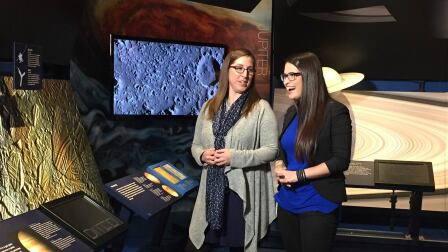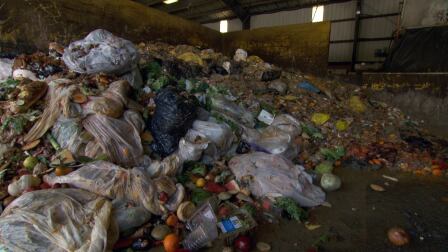
Simple Solution to Help the Homeless
Thousands of homeless people live in their vans and cars. But finding a place to park overnight makes life even more difficult and dangerous. One city has found a way to help by using small parking lots as safe overnight space for the “vehicular homeless.” Reporter Nic Cha Kim meets a working mother who lives in her SUV with three children, and a Vietnam vet with a job but lives out of his car so he can save for retirement. We also meet Kristine Schwarz, Executive Director of “New Beginnings Counseling Center” to find out how they took a good idea and turned it into a successful program, one that has attracted attention from other cities across the country.
Quick Links:
New Beginnings Counseling Center
Transcript
Nic Cha Kim: Santa Barbara . . . one of California's most desirable and affluent cities. But not everyone here is living the dream. It's early evening and Isabel is getting ready for her second job. Not far away, Dave is reading a book. But before they can do these simple things, they have to do something else – find a place to park. Dave has been living in his van for three years. Isabel’s been in her SUV for about a year. And if you think it's hard to find a place to park during the day, imagine trying to find a spot that lets you park safely and legally overnight. Isabel and Dave aren't alone. In Santa Barbara, there are hundreds of "Vehicular homeless" as they’re called. Kristine Schwarz is the Executive Director at New Beginnings Counseling Center. They tackled the parking problem back in 2004 with a simple solution.
Kristine Schwarz: The Safe Parking Program is a concept where you take an existing community resource, an empty parking lot, and you repurpose it to address a pressing community need -- in this case, the lack of shelter and/or housing for people.
Nic Cha Kim: It sounds simple. But there are plenty of issues to deal with. The police have to be on board. So do nearby residents. There are insurance issues. And what if too many homeless want to park at the same place?
Kristine Schwarz: When a person finds themselves living out of their vehicles, they typically call... They do need to have a valid registration, insurance, and license. They can't just show up at a parking lot and say, “I want to park here.”
Nic Cha Kim: If there's space, they'll receive a voucher to display on the dashboard. This lets the police and residents know they're allowed to park here. What are they allowed to do in the parking lots, just basically sleep?
Kristine Schwarz: Yes, the lots are shelters. It's very specifically, they're there to come, to go to sleep and leave.
Nic Cha Kim: They're only allowed to stay from 8:00 pm to 7:00 am. In the morning, every Safe Parker is expected to leave on time. Isabel found herself in financial trouble after leaving an abusive husband.
Isabel Murillo: So first I was staying with friends and families, but then it got to the point that my ex was constantly going around.
Nic Cha Kim: That's when Isabel started living out of her SUV. She has 4 kids -- three are with her; one is in college. So this is home?
Isabel Murillo: This is where home has been for the last nine months.
Nic Cha Kim: And all your possessions are inside this car?
Isabel Murillo: No, mostly the kid's clothes. Everything else that my kids own is in storage.
Nic Cha Kim: And every night she had to find a legal place to park.
Isabel Murillo: I was going online trying to figure out where I can park that would be safe.
Nic Cha Kim: That's how she found New Beginnings. She met their criteria and got a voucher.
Isabel Murillo: Where you're sitting, it's my 14-year-old daughter. Driver's side is where I sleep. Middle side is my 18-year-old, 6-foot son. Back side is my other son. Sometimes I'll go sleep with him when my oldest daughter is here from college.
Nic Cha Kim: It's really peaceful here.
Bob Strojek: Most of the lots are very quiet.
Nic Cha Kim: The parking program is all about safety. Bob is one of two monitors who check each lot every night. For safety reasons, the exact locations are kept confidential.
Bob Strojek: The parkers, generally, unless there's a squabble going on, there's not much from them. Most of them, they basically keep to themselves. They're supposed to be in their cars. They're here to sleep, basically. People go, "Oh, they're putting somebody here that might have a criminal record!" Most people don’t. They are trying to correct themselves.
Nic Cha Kim: Right. Is it really a problem of perception?
Bob Strojek: A lot of it is.
Nic Cha Kim: Most Safe Parkers don't cause problems, but, now and then, there are complaints from residents.
Kristine Schwarz: Literally people with binoculars looking through trees to see what's going on...
Nic Cha Kim: The key says Kristine is to address the issue quickly.
Kristine Schwarz: I think the immediacy with which we respond to any concern or complaint has really made it safe for people to embrace. We, to date, have won everybody over.
Nic Cha Kim: Tell me about your vehicle.
Dave Childers: Well, Nic, this is a 1996 GMC Savannah...
Nic Cha Kim: Dave has used the Safe Parking Program for two years.
Dave Childers: It doesn't quite have all the comforts of home -- it doesn't have toilet facilities obviously. It doesn't have cooking facilities.
Nic Cha Kim: Do you mind if I take a look inside?
Dave Childers: Absolutely. Go ahead.
Nic Cha Kim: This is actually very spacious inside. You do have a queen-sized bed in here.
Dave Childers: Yes, I do. It's very comfortable. Dave's a Vietnam Vet, working full-time as a handy-man at a private school. So why doesn’t he have his own apartment?
Dave Childers: For one reason. I'm 64 years old. I want to work until I'm 70. That's 6 years, OK. I want to put money away for my retirement.
Nic Cha Kim: Isabel is in a different position. She would love permanent housing so her kids can have a normal life. How are you managing the time between the jobs and taking care of your kids?
Isabel Murillo: It's hard. I sleep maybe 3 or 4 hours a night.
Nic Cha Kim: An added benefit of the parking program is that it puts the homeless in touch with other services.
Kristine Schwarz: So at night, we provide them with that shelter and during the day we provide them with case management and other types of assistance to help them find housing. Each year, we house somewhere between 50 to 60 people.
Nic Cha Kim: But Isabel's case is tricky. With two jobs, she makes too much to qualify for subsidized housing.
Isabel Murillo: Don't qualify for housing.
Nic Cha Kim: Really?
Isabel Murillo: Yes.
Nic Cha Kim: Why is that?
Isabel Murillo: I make too much money for a family of 4 kids.
Nic Cha Kim: And with bad credit, Isabel can't get an apartment on her own -- even when she offers to put down a double-deposit.
Isabel Murillo: I sometimes don't know where to go. It's the fear of... I don't qualify for anything.
Nic Cha Kim: Still she's hopeful that New Beginnings will help her put a roof over her head, eventually.
Kristine Schwarz: We don't have a time limit and the reason being is that it might take somebody two, three, four years before they can move into affordable housing.
Nic Cha Kim: The Safe Parking Program uses 20 different lots. But they only put a few parkers on each lot. It’s quieter and safer that way. Without this program, where would people go?
Bob Strojek: They'd be out on the streets.
Nic Cha Kim: The program costs about $2,500 per space per year. But funding is hard to get because, technically, parking lots are not shelters.
Kristine Schwarz: So we are not able to avail ourselves of any shelter funding that's available through the federal government.
Nic Cha Kim: Despite the obstacles she faces, Isabel is imagining a future where she can turn in her parking voucher and say goodbye to parking lot living. Where do you see yourself in 5 years?
Isabel Murillo: Hopefully, in my own home. Not one to rent, but one I own.
Nic Cha Kim: As for Dave? He has other plans. He'll keep working full-time to save money for a life far from Santa Barbara. You're going to retire in 6 years?
Dave: Yes.
Nic Cha Kim: Where do you see yourself?
Dave: I see myself in Washington state with a fly-fishing rod somewhere out on a stream.
Nic Cha Kim: There are only 115 parking spaces for people like Dave. They have a waiting list of about a hundred more. So when Dave is ready to move on, there will be someone else, eager to pull into an empty space . . . in a quiet lot . . . for a good night’s rest. I'm Nic Cha Kim for “SoCal Connected.”











